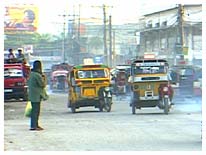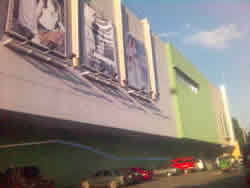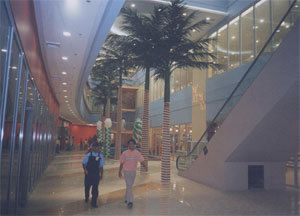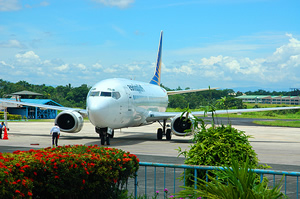Press Releases
Cotabato gearing up for growth
Manila Bulletin [February 6, 2006]
 COTABATO CITY—How does one re-invent the image of a place that is known more as a political hotspot than as a viable trade and investment center?
COTABATO CITY—How does one re-invent the image of a place that is known more as a political hotspot than as a viable trade and investment center?
For Cotabato-born businessman Pete Marquez, there are no easy answers. But as someone who has spent half of his working life abroad — allowing him to view things from an outsider’s vantage point — he believes that a change in the mindset of business leaders would be a good first step.
“There is really a need for a paradigm shift among members of the local business community,” explains the former Los Angeles-based real estate broker who is determined to help his hometown of Cotabato shed its negative image and project itself as an emerging business and tourist hub.
He recalls a time when the city was poised to become one of Mindanao's premier trading centers due to its strategic location and rich natural resources. Unfortunately, this potential remained unrealized when armed conflict erupted in the 1970s. Since then, Cotabato has been relegated to the economic sidelines, as other more peaceful cities rode the development bandwagon and posted double digit growth rates. His city, he laments “has always gotten the short end of the stick. This situation has to change,” he says.
“It’s about time local business people take the lead and become the city’s ambassadors of goodwill,” says Marquez, who is also the president of the Metro Cotabato Chamber of Commerce and Industry. The chamber, which receives financial and technical assistance from the USAID-funded Growth with Equity in Mindanao Program, is at the forefront of initiatives designed to create a more conducive business climate in the city.
He says that Cotabato business people should promote the city as a viable business destination during their business trips, as a means of helping the local government lure much-needed new investments to the city.
Marquez further elaborates: “Investors will not hesitate to put their money in an area if they see that it is conducive to business. This is where I think our local businessmen can play a crucial role. They need to put their money where their mouths are and demonstrate to prospective investors that they are confident about the city’s economy.”
The good news is that the local business community is responding positively to the challenge. For example, Superama, one of Cotabato’s pioneering commercial establishments, has spent millions of pesos upgrading its chain of stores, giving them a more elegant look.
Similarly, South Seas Mall, the city’s first state-of-the-art mall, opened its doors to the public last December.  The Mall serves not only the consumers
of Cotabato City but also residents of neighboring areas who come from as far away as the provinces of Maguindanao, North Cotabato and Sultan Kudarat.
The Mall serves not only the consumers
of Cotabato City but also residents of neighboring areas who come from as far away as the provinces of Maguindanao, North Cotabato and Sultan Kudarat.
Marquez has additional reasons to be optimistic. Manila-based companies have begun to look at Cotabato City with a new eye. Popular food chains Chowking and Greenwich have opened their first outlets in the city. Kentucky Fried Chicken is studying the possibility of opening a store in the area. Fast food giant Jollibee has recently opened three outlets in the city, which is a testament to its faith in the city’s economy and in the purchasing power of Cotabateños.
Marquez believes that the amount of disposable income in Cotabato has grown, which is proof that the purchasing power of the Cotabateño has increased. This is evidenced not only by the crowds that flock to commercial establishments but also by those who throng to the newly-opened entertainment centers in the city.
“This is the (untapped) market we would like to capture here in Cotabato City. We would like to see the day when Cotabateños no longer have to travel to other
cities just to have a good time with their families. The opening of the South Seas Mall  is just the start of better things to come for the city’s residents,” he says.
is just the start of better things to come for the city’s residents,” he says.
Development planners are also gearing up for increased business activity in the city. According to Danilo Buenbrazo, Officer-In-Charge of Department of Trade and Industry (DTI)-Cotabato City, the agency’s “SME Development Plan” is focused on improving the business incentive code and the business licensing process; on promoting competitiveness by introducing new business systems such as franchising; and on strengthening business organizations.
“The Plan also seeks to improve on existing business policies by providing incentives for information and communication technology (ICT)-related and big-ticket investments,” Buenbrazo adds.
Recently, Cotabato City and the rest of Central Mindanao have been the recipients of major investments in agribusiness, manufacturing, telecommunications, power, water systems, transportation and hotel development. The area’s export winners include abaca pulp, garments, aquamarine products, house wares and wood products, sugar and semi-processed rubber.
For Dong Anayatin, Cotabato City Planning and Development Coordinator, the area’s sound physical infrastructure should prove attractive to those
contemplating investments in the region, which boasts an extensive road network connecting the city to most key points in Mindanao.  Shipping produce from the
city to different parts of the country is also straightforward, and is facilitated by the proximity of the Awang Airport, the Polloc International Port,
and various municipal ports. Moreover, the city is home to highly competent professionals in the fields of agricultural science and engineering, and has a
skilled, flexible labor force.
Shipping produce from the
city to different parts of the country is also straightforward, and is facilitated by the proximity of the Awang Airport, the Polloc International Port,
and various municipal ports. Moreover, the city is home to highly competent professionals in the fields of agricultural science and engineering, and has a
skilled, flexible labor force.
Anayatin calls on prospective investors to take a closer look at Cotabato City and “to take advantage of its various business incentives.”
During the recently-held Cotabato Business Conference, in which over 200 local entrepreneurs participated, together with representatives from NGOs and government, Marquez renewed his call to his colleagues in the business community to unite and to work with the local government to achieve the dream of a progressive, business-friendly and peaceful Cotabato City.
“Cotabato City was once considered the premier trading post in Mindanao. It is time to reclaim that lost glory,” Marquez concludes.
Also published in The Philippine Star, February 5, 2006





